
Guests
- Andrew Revkinenvironmental reporter for the New York Times. He also writes for the NYT’s Dot Earth blog.
World leaders are arriving in Copenhagen as the climate summit formally enters high-level talks. On Tuesday, US climate negotiator Todd Stern said he foresees no change in President Obama’s offer to cut emissions by 17 percent of 2005 levels. We speak to Andrew Revkin, environmental reporter at the New York Times. [includes rush transcript]
Transcript
AMY GOODMAN: This is Climate Countdown, Climate Crackdown. I’m Amy Goodman. We’re inside the Bella Center. For a look at what’s happening inside here, we’re joined now by Andy Revkin. Andrew Revkin is the outgoing environmental reporter for the New York Times. We’ll talk about htat in a minute.
But, Andrew, what’s happening inside here, as thousands are outside protesting?
ANDREW REVKIN: Well, there’s an epic fight over words and what they mean. China, the United States, Europe, poor developing countries are in a tug-of-war over the meaning of global warming. Each of these blocs, essentially, defines this problem differently, and that’s why you have these huge gulfs to bridge before two more days are up. You know, having covered these cycles since before there was the first treaty in 1992, it seems very late in the game to have such significant differences over the language in this agreement.
AMY GOODMAN: For people who are not following this — the United States, probably number one in the world for not being as aware of the issue of global warming as others, especially in the Global South — explain exactly where we are with President Obama arriving here along with more than a hundred world leaders, what it means for delegations, like, well, the whole African bloc, to walk out the other day, but now the ministers are here, and then the presidents and prime ministers.
ANDREW REVKIN: Almost all the tensions that are in play here date back to 1992, when the very first convention on global warming was signed by another president, George — the first George Bush. That was the last time a US president went to the climate talks. And now it’s crunch time. Basically, back then it was all aspirational. You know, we all pledged to avoid dangerous warming, but no one defined “dangerous,” no one defined any of the key terms. So it was all — and it all — by 2000, it all looked like it was failing — actually, by the mid-‘90s.
So then the Kyoto Protocol was supposed to be the tighter, more firm, legally binding approach. That has faltered. So now it really is crunch time. It’s kind of like, you know, you put off your homework, you put off your homework, you put off your homework. And they’re still, of course — even after here, they’re going to put it off one more time.
AMY GOODMAN: You have President Clinton signing the Kyoto treaty. You have President Bush withdrawing from the treaty. President Obama could actually re-sign the Kyoto Protocol, is that right?
ANDREW REVKIN: Oh, no, no, no. In fact, they’ve rejected that utterly. The Kyoto Protocol is not going to be something — as Todd Stern said here just yesterday, the chief climate negotiator for the US, said we’re not —- it’s done. It’s [inaudible] -—
AMY GOODMAN: I understand, but the Kyoto Protocol is not over.
ANDREW REVKIN: It’s not over. The binding elements of it are something the developing countries want to see moved into whatever broader agreement emerges here, so that the good part, the firm, legally binding part of this Kyoto pact, which never has applied beyond three dozen countries, all the developed countries except the United States — they’re the only ones who are bound by its restrictions on gases.
And the United States delegation here says, “Look, 97 percent of the growth in these emissions in the next thirty years is not going to be in the United States or Europe. We’re already flat or declining, basically. It’s going to be in developing countries. So, if you care about climate, you can’t have an agreement that doesn’t include them. And that’s” — they say it’s just simple science has to have that involvement.
AMY GOODMAN: Talk about China.
ANDREW REVKIN: China — I was just at their delegation press briefing yesterday. There are three things they’re concerned about, I guess. The big one — well, they’re all big. I asked them to characterize them.
They said trade. There are terms in this draft agreement that would potentially allow trade sanctions, border tariffs, to apply. If a country in, say, 2020 is not abiding by its pledges, then other countries could slap on a tariff. China is absolutely dead set. They say this is just an excuse for protectionism. It’s just environmentalism cast — it’s actually protectionism cast as environmentalism. That is one thing they’re absolutely dead set on not having. The Senate and the House both are — you know, the bills that are moving here all partially want to protect American jobs, and so they want to have that locked-in guarantee. China is resisting firm words on what’s called MRV — measurable, reportable, verifiable — changes in its emissions trajectories.
And again, the Senate — the way a treaty works in the United States, you need two-thirds Senate approval. A president can’t just sign a document to have a treaty take effect here. And that’s sixty-seven votes. And just think of the fights that we’ve seen over getting sixty votes, or even fifty, in some cases. So that’s — it’s a very high hurdle. It’s just part of our democracy. And that’s something that completely hampers President Obama. He can’t come here and just sort of have a good idea without considering how it relates to the Senate.
AMY GOODMAN: Andrew Revkin, you have been covering environmental issues for, what, close to fifteen years —-
ANDREW REVKIN: Twenty-five.
AMY GOODMAN: —- at the New York Times? Twenty —-
ANDREW REVKIN: Oh, fifteen at the New York Times, yeah. But -—
AMY GOODMAN: And you are — you’ve just resigned?
ANDREW REVKIN: You know, we’re shrinking the newsroom by a hundred — we have shrunk, as of this past week, by a hundred jobs. And I chose to take one of the buyouts that were offered, so other people would not get fired. And we didn’t reach a hundred buyouts, so that means right now, as we speak, people are being told they’re losing their jobs.
AMY GOODMAN: Well, I want to continue to talk to you about this. Right now we’re going to go to break. And Evo Morales, the president of Bolivia, just gave a speech in the room right next to ours. We are continuing to cover what’s happening outside and inside. You’ll be going on to teach?
ANDREW REVKIN: Teaching. I’m going to keep writing, for the Times, too. And the blog “Dot Earth” is going to keep going, too.
AMY GOODMAN: That’s “Dot Earth” at the New York Times.
ANDREW REVKIN: Yes, nytimes.com/dotearth.
AMY GOODMAN: Andrew Revkin is the outgoing environmental reporter for the New York Times.

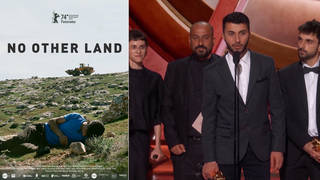
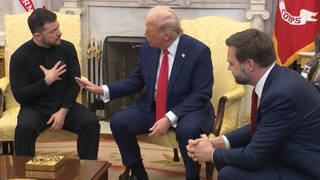
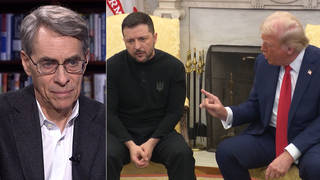
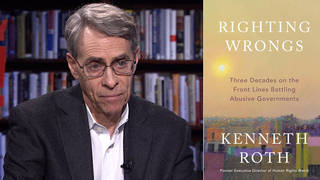






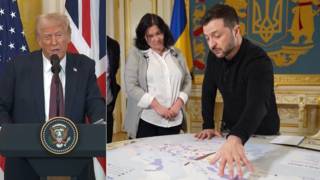
Media Options